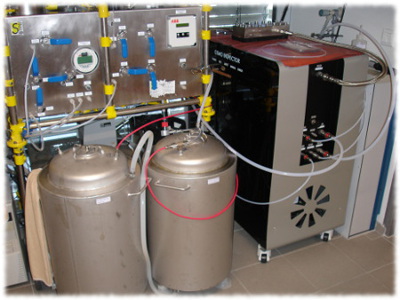java Data Aquisition
 The jDAQ software is a byproduct of my PhD graduation at the Leibniz-Institute of Polymer Research Dresden. My gratitude to the IPF!
Working in the field of chemistry, I needed software to read, format and save data from laboratory measuring instruments in order to record developing of values. Data aquisition software yet exists and is being offered i.e. from the producers of the devices. But the software is expensive and initially jDAQS and jDAQK were intended as simple utilities. Such simple software could be realised by myself. For more flexibility and comfort in use, as well as for debugging, more and more functions were added over time. As the programs became more flexible and poor in errors, I decided to distribute them for the general public.
The jDAQ software is a byproduct of my PhD graduation at the Leibniz-Institute of Polymer Research Dresden. My gratitude to the IPF!
Working in the field of chemistry, I needed software to read, format and save data from laboratory measuring instruments in order to record developing of values. Data aquisition software yet exists and is being offered i.e. from the producers of the devices. But the software is expensive and initially jDAQS and jDAQK were intended as simple utilities. Such simple software could be realised by myself. For more flexibility and comfort in use, as well as for debugging, more and more functions were added over time. As the programs became more flexible and poor in errors, I decided to distribute them for the general public.

If the software is of benefit for only some people, then the effort was worth it. I would be grateful for feedback.
Why do jDAQS and jDAQK communicate via the COM-Port (RS232)?
The generation of laboratory measuring instruments that is used today, produced between 1990 and 2015, is mostly equipped with a RS232 interface. In the last years the share of USB-interfaces is increasing but still not common. The support of the USB interface is a topic for future development of jDAQ.
Why are the programs written in Java?
Java is intentionally not a hardware-oriented programming language. Java programs are communicating only indirectly with the operating system over the runtime environment. As an advantage the software becomes independent from the hardware and the operating system. The same program is running on all devices, that offer a Java runtime environment. But on the same time there are disadvantages, that should not be concealed. Java does not offer low-level functionality for hardware specific operations, in order to achieve high compatibility. The direct communication with the RS-232 and USB interfaces belongs to such low-level operations. The libaries that provide this functionality for Java and used by jDAQ are written from programmers in private. There is the 'Java Communications API' (or 'CommAPI'), that was included in the list of official extensions in 1998, but is neither supported nor further developed by Sun (now Oracle). And there is RxTx, that was developed until 2011.

More information can be obtained at 'Future' or the software description.